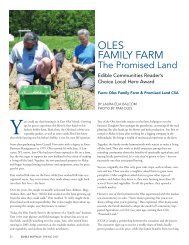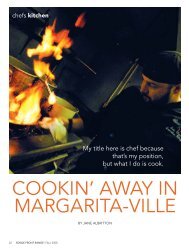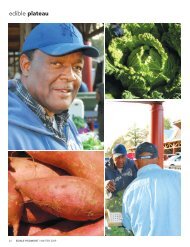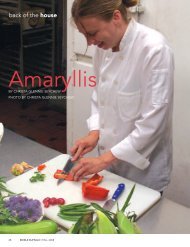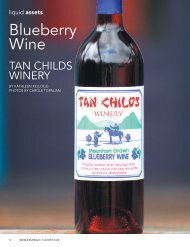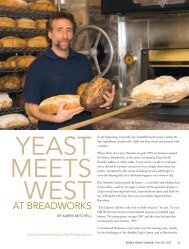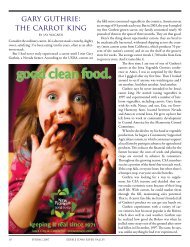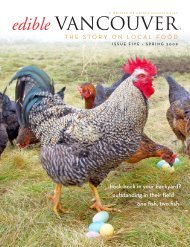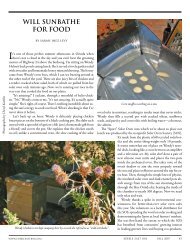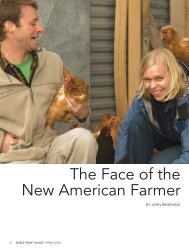The pleasure of eating - Edible Communities
The pleasure of eating - Edible Communities
The pleasure of eating - Edible Communities
Create successful ePaper yourself
Turn your PDF publications into a flip-book with our unique Google optimized e-Paper software.
<strong>The</strong> Pleasures <strong>of</strong> Eating<br />
By Wendell Berry<br />
<br />
Farmer-philosopher and poet Wendell Berry<br />
wrote this essay almost two decades ago<br />
as part <strong>of</strong> his collection What Are People For?<br />
His incisive advice to eaters needs no refreshing.<br />
Many times, after I have finished a lecture on the decline <strong>of</strong> American farming and rural life, someone in<br />
the audience has asked, “What can city people do?”<br />
“Eat responsibly,” I have usually answered. I have tried to explain what I mean by that, but afterwards I<br />
have invariably felt there was more to be said. I would like to attempt a better explanation.<br />
I begin with the proposition that <strong>eating</strong> is an agricultural act. Eating ends the annual drama <strong>of</strong> the<br />
food economy that begins with planting and birth. Most eaters, however, are no longer aware that this is<br />
true. <strong>The</strong>y think <strong>of</strong> food as an agricultural product, perhaps, but they do not think <strong>of</strong> themselves as<br />
participants in agriculture. <strong>The</strong>y think <strong>of</strong> themselves as “consumers.” If they think beyond that, they<br />
recognize that they are passive consumers. <strong>The</strong>y buy what they want—or what they have been persuaded to<br />
want—within the limits <strong>of</strong> what they can get. <strong>The</strong>y pay, mostly without protest, what they are charged.<br />
And they mostly ignore certain critical questions about the quality and the cost <strong>of</strong> what they are sold: How<br />
fresh is it? How pure or clean is it, how free <strong>of</strong> dangerous chemicals? How far was it transported, and what<br />
did transportation add to the cost? How much did manufacturing or packaging or advertising add to the<br />
cost? When the food product has been manufactured or “processed” or “precooked,” how has that affected<br />
its quality or price or nutritional value?<br />
Most urban shoppers would tell you that food is produced on farms. But most do not know what<br />
farms, or what kinds <strong>of</strong> farms, or where the farms are, or what knowledge or skills are involved in farming.<br />
<strong>The</strong>y apparently have little doubt that farms will continue to produce, but they do not know how or over<br />
what obstacles. For them, food is pretty much an abstract idea—something they do not know or imagine—<br />
until it appears on the grocery shelf or on the table.<br />
<strong>The</strong> specialization <strong>of</strong> production induces specialization <strong>of</strong> consumption. Patrons <strong>of</strong> the food industry<br />
have tended more and more to be mere consumers—passive, uncritical, and dependent. Indeed, this may<br />
be one <strong>of</strong> the chief goals <strong>of</strong> industrial production. <strong>The</strong> food industrialists have persuaded millions <strong>of</strong><br />
consumers to prefer food that is already prepared. <strong>The</strong>y will grow, deliver, and cook your food for you and<br />
ediblegrandetraverse.com Spring 2008 / <strong>Edible</strong> Grande Traverse 23



